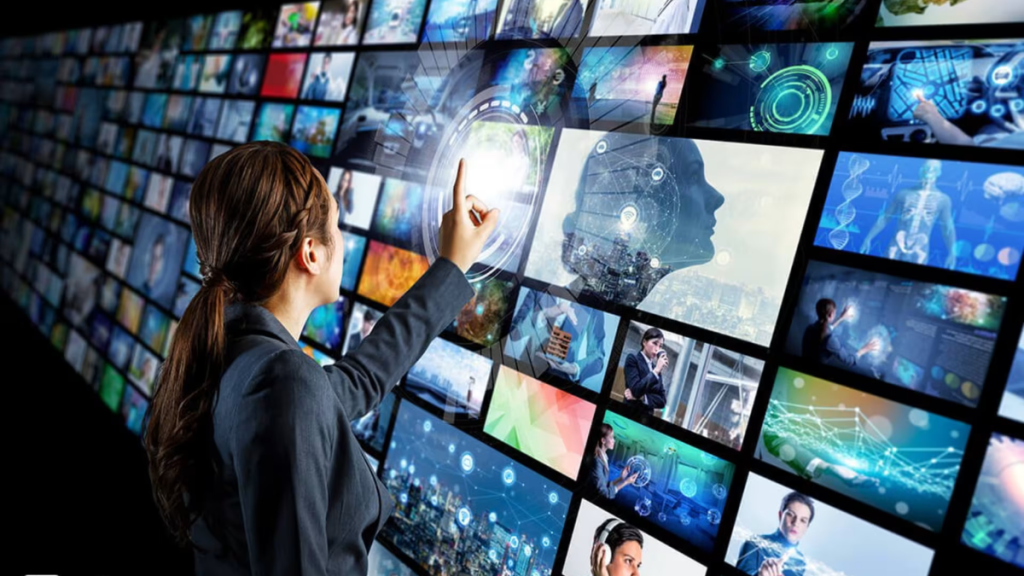Creativity is no longer the sole domain of the human mind in the digital age. Artificial intelligence (AI) has been thrusting into sectors long deemed to be based on human imagination and instinct alone. One of the most fascinating sectors where AI is leaving its footprint is entertainment — from films and music to video games and content recommendation. What used to be created solely by artists and authors is now being crafted, accelerated, or even produced by algorithms. Welcome to the age of code-scripted entertainment.
The Rise of AI in Creative Production
AI is playing entertainment no more science fiction, but a solid and emerging reality. For television and movies, AI software is already used to write scripts, design storyboards, and even forecast box office success of a film. Software like ChatGPT, Skript.AI, and Sudowrite can assist screenwriters with plot ideas, developing dialogue, or scene rewrites. These solutions do not replace the nuanced creativity of human writers but can speed ideation and remove creative bottlenecks.
AI’s visual capabilities are also changing the production landscape. Generative AI platforms such as Runway, Sora, and DALL·E allow creators to produce realistic imagery and video sequences without massive production crews or budgets. Directors can now visualize entire scenes with AI before a single actor step on set — a huge leap in both cost-saving and storytelling efficiency.
Music Made by Machines
Music composition is another field being reimagined by AI. Software like Amper Music, AIVA, and Soundraw allow users to write original music pieces in minutes depending on mood, tempo, and instrumentation. Mainstream artists have even begun incorporating AI for composing melodies or beats, with a combination of machine learning and human input.
AI. It has also been used to “reanimate” the voices of iconic artists. On the one hand, the singing voices of classic stars recreated through deepfakes; on the other, virtual collaborations between dead and living musicians. The ethical line between homage and exploitation is strongly being fought over. However, the technology continues to expand, reshaping how we conceptualize music making, performance, and legacy.
Personalized Content Curation
If AI is not writing what you’re reading, chances are it’s curating what you’re reading. On all of the foregoing platforms, recommendation engines are algorithm-driven by behavior data to spit out super-personalized streams of content. Your watch or listen history is used to train these engines to suggest the next thing you’ll want to watch or listen to.
This kind of personalization has reshaped the user experience into a more effective, addictively engaging discovery of content. But it has also given rise to concerns about filter bubbles and culture homogenization. Are we being shown more diversity of content, or is AI artificially constraining our tastes based on what it believes we will like?
Gaming Gets Smarter
Gaming has been at the forefront of AI uptake for a number of years. From simple NPC behavior programming to today’s generative AI-created worlds, the gaming industry continues to stretch the tech boundaries. Games like AI Dungeon allow users to co-author real-time fantasy narratives alongside language models. AI is also being utilized by game developers to create dynamic worlds, adaptive foes, and even customized storylines for players.
More recently, generative AI is used to create textures, animations, and even voiceovers on autopilot — slashing development time by orders of magnitude. In multiplayer worlds, AI can patrol chat, game balance, or adjust difficulty levels in real time, making for more immersive and accessible games.
The Ethics of Algorithmic Entertainment
As AI is taking on more of a role in storytelling, music, and performance, the entertainment industry is facing new ethical challenges. Who is responsible for content generated by AI — the tool maker, the user, or the code? How do we assign contributions when AI comes in along the way? And what do we do when AI-generated content begins to outperform human content in terms of reach or engagement?
They also pose a question of labour displacement. With improving AI capabilities, there is a good chance that the demand for traditional work — writers, composers, graphic designers — will decrease or radically change. Yet, on the flip side, there are new career paths emerging: AI prompt engineers, data curators, and human-AI collaboration specialists. Thankfully, actors, studios, and production studios can engage the services of an attorney specializing in AI and digital media law. These experts protect their clients’ interests in contract negotiations, publicity rights, and intellectual property protection.
The Democratization of Creativity
One of the most thrilling applications of AI in entertainment is the democratization of creation. You do not require access to a studio, orchestra, or film crew in order to create engaging content. A teenager with a laptop and the proper tools can create a short movie, write music for it, or construct a game in his bedroom. AI has reduced the entry barrier, allowing more voices and viewpoints to come into the entertainment arena.
This openness has profound implications, especially for artists from underrepresented groups or geographies. With the appropriate guardrails in place, AI has the potential to be an agent of inclusivity and creativity — a vehicle to diversify international narrative.
What’s Next
As AI continues to develop, its role in entertainment will increasingly become more in-depth and sophisticated. Entire films or albums produced in a collaboration between man and machine, interactive stories evolving based on audience input, or virtual stars with AI-augmented personalities dominating social media are all possible predictions.
But the essence of entertainment — emotional connection, cultural relevance, and human storytelling — will most likely always remain a human undertaking, even if machines are assisting. The future is not AI replacing artists; it’s AI as an incredibly powerful co-creator.
In this new world, code doesn’t just power the background — it shapes the foreground. Entertainment is no longer just written by humans; it’s increasingly written by code. And that may be the most thrilling plot twist of all.

